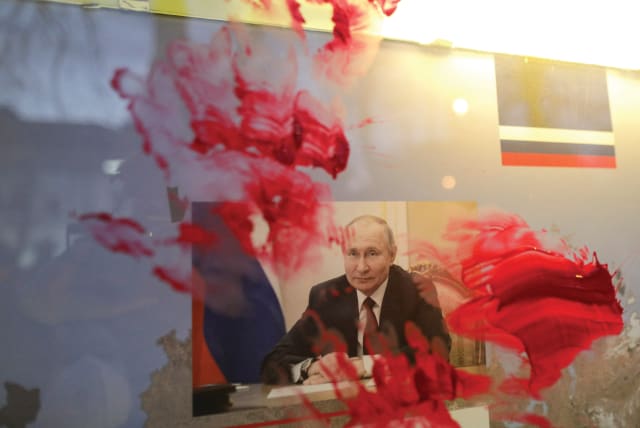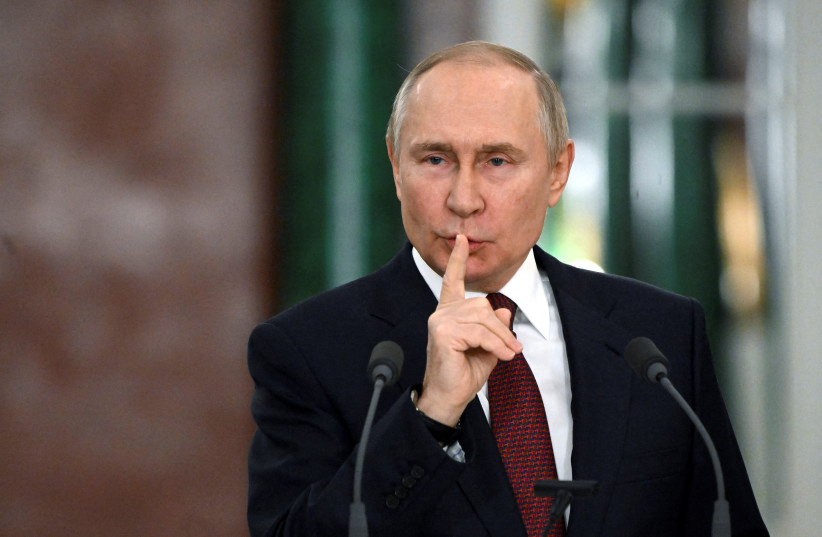Russia's military disaster began in war on democracy

MIDDLE ISRAEL: One year after the outbreak of the Ukraine war, the only man who can end it is the one who started it.
Last year, with the Ukraine war’s outbreak a week away, and its nearly 250,000 future casualties still alive and well, Russia’s leader faced three choices, as The New York Times listed them four days before the offensive: “One massive nationwide attack; a series of bites that dismantle the country piece by piece; or a python-like squeeze,” meaning attacking from two directions, the second being Belarus.
In fact, Putin chose a fourth course: Stun Ukraine with a blow to its political heart and end it all in several days. Instead, one year on, the war seems closer to its beginning than to its end.
What conclusions can be drawn one year from the Russia-Ukraine War's beginning?
Even so, some preliminary conclusions can already be drawn from what has unfolded so far, and the first is about Russia’s place in the world.
Russia entered this war as a resurrected superpower and emerges from its first year as a geopolitical cripple.
Having recalled the effectiveness of Russia’s intervention in the Syrian Civil War, the world expected a swift and efficient military performance. Instead, the Russian military was exposed as a giant with feet of clay, suffering from poor equipment, unimaginative command, cumbersome logistics, insufficient training and low morale.
The loss of geopolitical prestige was compounded by the loss of geopolitical assets, when previously neutral Sweden and Finland decided to join NATO, thus frustrating one of the war’s declared aims: to prevent NATO’s expansion.
Similarly, the Russian apparent assumption, that Western backing of Ukraine will be mainly verbal, has proven unfounded, as did the Russian hope that the war would crack the European Union’s anti-Russian front.
Conclusion number one, then, is that Russia is not the superpower it wanted us to think it is. This grim picture, from the Russian viewpoint, was tempered by what transpired on the economic front.
WESTERN SANCTIONS have been far less effective than originally assumed. The Russian economy did not collapse, and the Western powers learned, the hard way, that they are no longer alone in leading the global economy.
With China, India and Brazil failing to join the sanctions, along with much of the Third World, Russia had plenty of buyers for its bottomless supply of raw materials. Even the inability to use the dollar, du e to the sanctions, proved a blessing in disguise, as Russia’s partners agreed to use the ruble instead.
The combination of continued demand for Russian exports and the unexpected demand for the ruble resulted in its recovery from its 50% collapse after the sanctions’ imposition. In fact, the ruble is now worth almost 10% more than its dollar value the month before the war’s outbreak.
The war, then, exposed the limits of Western economic clout. However, Russia’s hope that the refusal to buy Russian gas would divide Europe never materialized. Conclusion number two, then, is that economic pressure is an unreliable weapon.
Having said this, what happened economically exposed the deep industrial gaps between Russia and the rest of the powers.
The failure of Russia’s weapons on the battlefield was colossal, and Western arms’ superiority was sweeping. The Russian failure was revealed twice. First, in terms of planning, it reflected post-communist Russia’s ill-conceived choice to rest its economy on mining and farming, at the expense of industrial development and expansion.
Second, in terms of production, Russian weapons’ unreliability is believed to reflect industrial corruption, including managers’ theft of raw materials and cheating on performance tests. Added up, these diplomatic, economic and social failures shed light on the Russian misadventure’s two moral aspects: political accountability and historical responsibility.
Vladimir Putin is the mastermind behind this political tragedy
THE WAR is a direct result of Russia’s lack of political freedom.
In terms of its outbreak, there was no free public debate on the Ukrainian campaign’s aims, costs or its very necessity. In terms of its management, the people are not being properly informed about the war’s casualties, and there are signs that the share of the poor, the undereducated, and the disenfranchised among Russia’s combat troops and war fatalities is disproportionate.
The control of information and the lack of public debate resulted in the government’s claim that it is going to war with a “Nazi” government that is waging “genocide.” Had Russian society been free, the press would have demanded proof and exposed the blatant lies that the government used while killing thousands, displacing millions, and wasting billions in a patently senseless war.
Overarching this political tragedy is the role of its mastermind, Vladimir Putin.
The historiographic debate about the role of the individual in history is in this case irrelevant. Unlike, for instance, the Thirty Years’ War, the American Civil War, or the Arab-Israeli wars, this war is not the result of social processes that involved thinkers, writers, orators and grassroots movements over many years.
The Ukraine war emerged from one man’s mind – the man who remains the only one who can end it. This autocratic context, and the bloodbath that is its result, should serve as a warning to democracy’s discontents elsewhere.
Having said this, Russia’s unfolding military defeat and the collapse of its imperial scheme do not mean that Israel can afford to join the West’s anti-Russian effort.
The Jewish state must take into consideration the sizable Jewish communities on both sides of this conflict, and it has to accommodate Russia’s military presence and political role across its Syrian border.
That is why Naftali Bennett and Yair Lapid chose to be militarily neutral, a choice upheld by Benjamin Netanyahu, thus producing a consensus that now shimmers as a ray of light in these Israeli days of awe; days of awe in which some Israelis derive inspiration from Putin’s emasculation of his country’s media and courts; days of awe in which Russians’ search for a ray of light is even more elusive than ours.
www.MiddleIsrael.net
The writer, a Hartman Institute fellow, is the author of the bestselling Mitzad Ha’ivelet Ha’yehudi (The Jewish March of Folly, Yediot Sefarim, 2019), a revisionist history of the Jewish people’s political leadership.
Jerusalem Post Store
`; document.getElementById("linkPremium").innerHTML = cont; var divWithLink = document.getElementById("premium-link"); if (divWithLink !== null && divWithLink !== 'undefined') { divWithLink.style.border = "solid 1px #cb0f3e"; divWithLink.style.textAlign = "center"; divWithLink.style.marginBottom = "15px"; divWithLink.style.marginTop = "15px"; divWithLink.style.width = "100%"; divWithLink.style.backgroundColor = "#122952"; divWithLink.style.color = "#ffffff"; divWithLink.style.lineHeight = "1.5"; } } (function (v, i) { });

